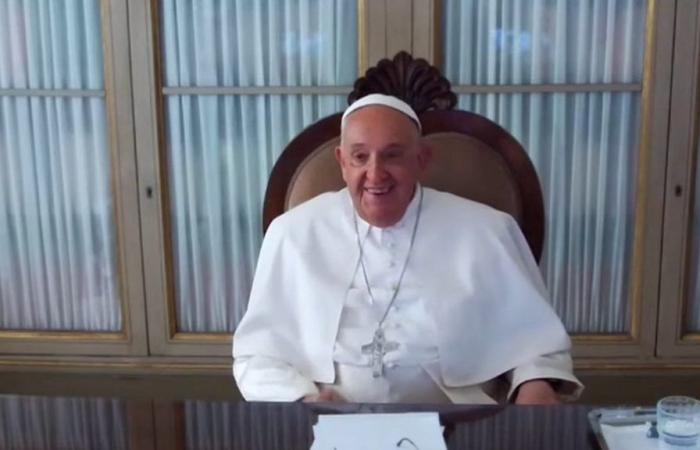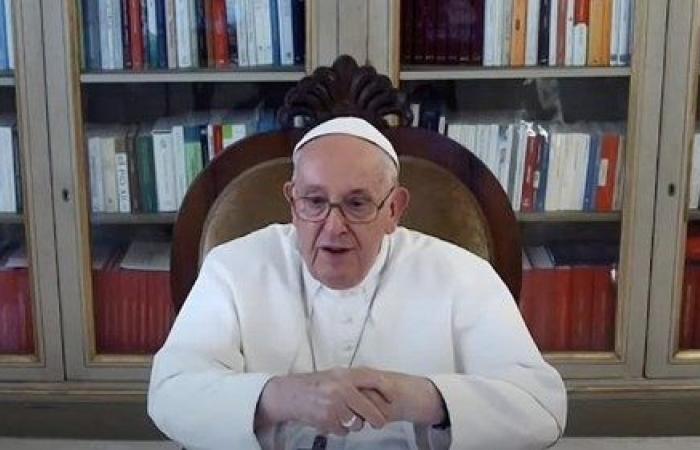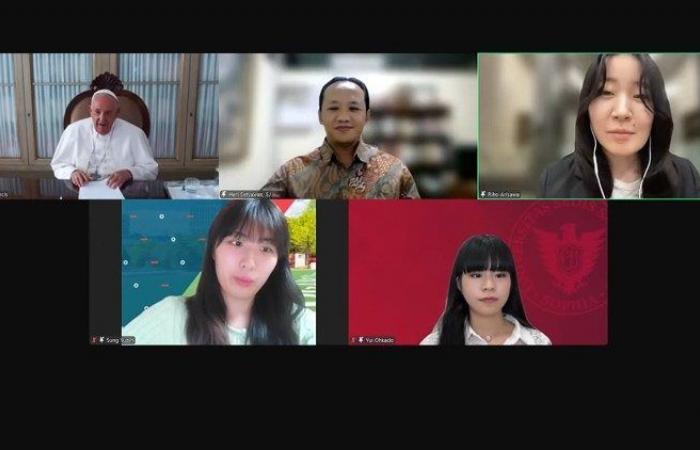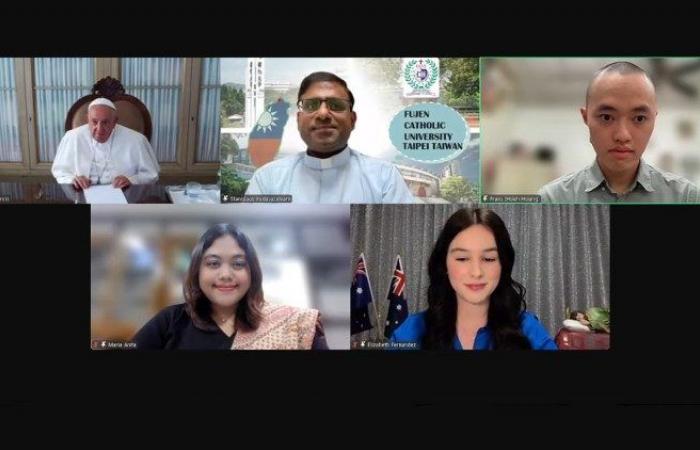The Holy Father intervenes through the Zoom platform in the fourth meeting of the “Building Bridges” cycle, this time with university students from Asia-Pacific, in an event organized by the Pontifical Commission for Latin America in collaboration with Loyola University of Chicago.
Sebastian Samson Ferrari – Vatican City
“Technology helps, but it is not enough. The human vocation seeks belonging, hence the origin of surnames (…) The young person needs belonging,” expressed Pope Francis in his conversation via the Zoom platform with university students from the Asia-Pacific region in the fourth meeting of the cycle “ Building bridges.” The initiative, held this Thursday afternoon, June 20, was organized by the Pontifical Commission for Latin America (CAL) in collaboration with Loyola University of Chicago and different Dicasteries of the Roman Curia and continues the talks that began in February 2022 with boys from the Americas, Africa and South Asia.
The activity was introduced by Dr. Emilce Cuda, secretary of the CAL, who explained that many young people have decided to migrate to the Asia-Pacific region to study or work in those lands. For this reason, they decided to begin building a link with said reality. The young people connected came from Japan, New Zealand, Taiwan, the Philippines, Papua New Guinea, Indonesia, Singapore and East Timor (in fact, Francis will visit these last four countries in September).
View the full broadcast of the meeting “Building bridges” in Spanish
Video messages of greetings, encouragement and support sent by Cardinal Kevin Farrell, Prefect of the Dicastery for the Laity, Family and Life, and by Monsignor Luis Marín de San Martín, Undersecretary of the General Secretariat of the Synod, were also projected. of the Bishops. In turn, the CAL secretary read a letter from Cardinal José Tolentino de Mendonça, Prefect of the Dicastery for Culture and Education.

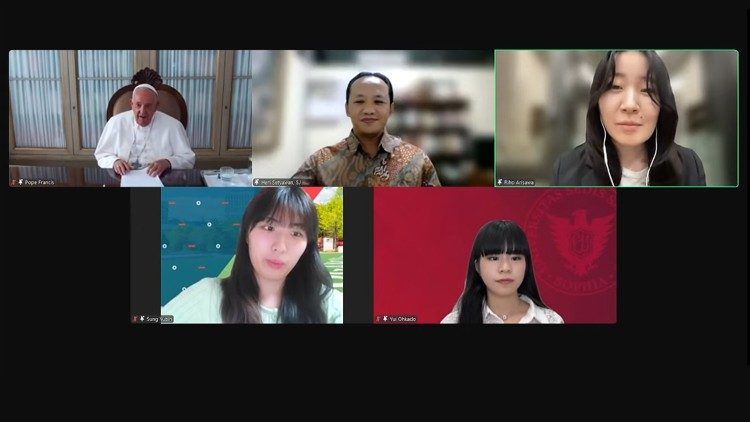
Meeting of the Pope with young university students from Asia-Pacific, Thursday, June 20, 2024.
The belonging
The young people, divided into four work groups, presented some ideas that arose in their discussions and raised different concerns to the Holy Father, who listened to them carefully and took notes. In the first part, the Successor of Peter reflected on the importance of belonging and maintained that an instruction that does not give belonging somehow deceives and fills the head with concepts, but his heart remains without belonging. He also highlighted the relevance of belonging for mental health: belonging to a family, to a group of friends, to a religious denomination. Then, the Bishop of Rome encouraged them to ask themselves: “What are my real belongings?”
Francisco made it clear that in this age of automatism the only thing that seriously calls for are testimonies. “That belonging leads you to human dignity,” he noted, “and human dignity is received and given with a human testimony, of belonging, of participation,” added the Pontiff. Along these lines, Bergoglio specified that testimony saves us from vulnerability and mentioned that there are many young people exposed to it for different reasons. Therefore, he recommended that they think about themselves: “What do I have in my life that is most vulnerable? Where am I weakest?”, so that they can monitor, help themselves and allow themselves to be helped in the face of vulnerability.
Mental health and discrimination
Francisco considered that discrimination is one of the factors that most affects mental health. Immediately, he questioned his interlocutors: “Do I feel discriminated against? Do I discriminate against others? “With what guidelines do I discriminate? ”And he urged them to continue with the testimony, with the healing that comes from the ability to have one’s own identity, and also by asking for help and helping each other. “Testimony, mental health and belonging,” the Pope reiterated.
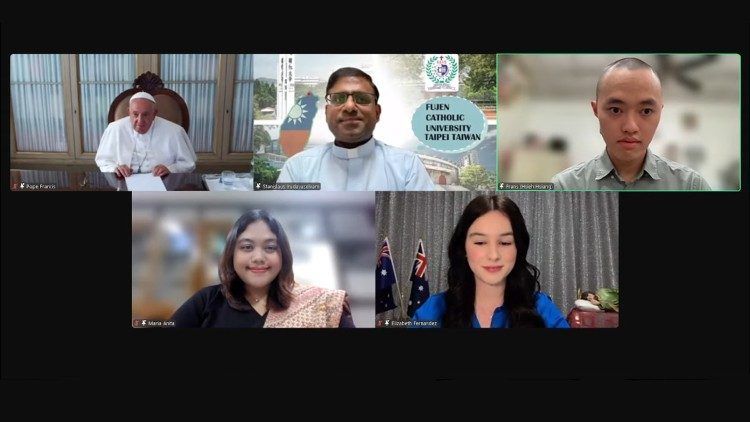
Meeting of the Pope with young university students from Asia-Pacific, Thursday, June 20, 2024.
See again the greatness of women
The Pontiff also referred to gender discrimination and warned about its danger: he stated that, in the modern social conception, women are “second category”, “those who are valuable are men, but we see that today in In the world, women are the best leaders, and here in the Vatican we have many women leaders,” she observed.
Francisco asked to see again the greatness of women, since “she is superior to men in terms of capacity, intuition (…)” and pointed out that the capacity for motherhood gives her a much more effective position of action than men.
“Discrimination against women does not exist,” claimed Francisco, remembering so many women alone or abandoned by their husbands and said that “one of the most beautiful things in creation is feminine intuition.”
The Holy Father suggested that the problem of discrimination is resolved with “projimidad,” a term he coined at the meeting to designate the ability to “become a neighbor.” “We are all neighbors,” he continued, and enriched his message with some considerations about love, remembering that the capacity to love creates creation. In this regard, he advised the boys not to be afraid and to know how to distinguish true love from false love.
Referring to the words of a student about gender, who mentioned the high rate of HIV in the Philippines, the Pope called for fighting to ensure that healthcare is prepared to treat and help all people, without exclusion, seeing them as brothers and sisters. sisters.
“To grow well you have to be in the daily struggle”
The Pope also alluded to the need for a harmonious education, in which the mind, heart and hands are coordinated and, as he has done on other occasions during his Pontificate, he commented that in some places an education is offered “only cerebral, of concepts.” “That is not education, it is partial instruction,” he stated. On this point, the Pontiff assured that, to grow well, we must be in the daily struggle, in work, in the exchange of ideas every day.
Expanding on the value of the diversity of religions, an issue outlined by a participant in the meeting, Francis encouraged them to dialogue with others and asserted that isolation damages the heart. “And in a person who isolates himself, all kinds of vices grow, all kinds of bad habits. In order not to isolate ourselves, we have to have training in the faith: to know well what our faith is, and that leads us to be authentic Christians,” he continued. Next, he warned of the temptation of a “rosewater” Christianity, that is, without substance. “No, concrete Christianity,” he urged, adding: “No loneliness and isolation. To dialogue you need a very great identity.”
Francisco expressed his joy at participating in the meeting: “It helps me understand what the life of young people is like (…) You have a lot to give as a culture, do not feel inferior.”
“Ideology is a disease”
The danger of ideologies was another of the concepts formulated by the Pope in one of his responses: “We live in a very ideologized culture, and this is serious,” he said. Furthermore, he praised the drama that any ideology represents and entrusted young people to strive for dialogue in harmony with other cultures. In turn, he advocated creating peaceful, stable and constructive relations.
Before the conclusions, the Holy Father pointed out that we still live in a sexist culture, in which women are relegated to the background, and called to fight against it. “Machismo is a serious disease of society,” he concluded.
He also reiterated his call to sow peace, which “is not easy, but it is the best we can do,” he explained.

